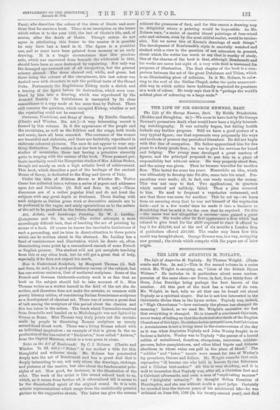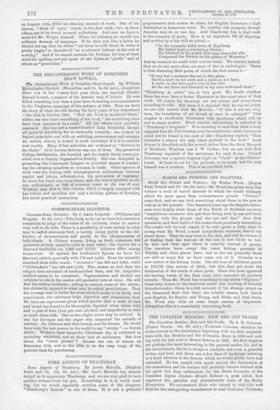THE LIFE OF AUGUSTUS M. TOPLADY.
The Life of Augustus H. Toplady. By Thomas Wright. (Fern- combo and. Son. 60. net.)—This is the second volume in a series which Mr. Wright is carrying on, "Lives of the British Hymn Writers." He includes in it particulars about some contem. poraries of the same class—no fewer, in fact, than thirty-four of them, John Berridge being perhaps the best known of the number. All this part of the book has a value of its own. Mr. Wright, in fact, tells us all that can be found out about Toplady as a spiritual singer. But he is not less interested in the Calvinistic divine than in the hymn writer. Toplady was, indeed, a "High Churchman "—how curiously the phrase has changed its meaning! Indeed, as we read Mr. Wright's narrative we feel that everything is changed. He is himself a convinced Calvinist, never weary of telling us that the doctrinal standards of the English Church are of this typo. Doubtless he has sympathisor8, but Calvinism v. Arminianism is not a living issue in the controversies of the day as it was when Augustus Toplady and John Wesley fought in so furious a fashion. Wesley was to Toplady "the parent of a horrid rabble of unhallowed, frontless, obsequious, rancorous, cobbler- parsons, baker-pamphletoore, and other blind bigots and hideous abortions in whose veins ran gall in the place of blood." The " cobbler " and "baker" taunts wore meant for two of Wesley's lay preachers, Onions and. Sellers. Mr. Wright remarks that such reproaches "ill become one who held in honour Syrian fishermen and a Cilician tent-maker." All this is very shocking, and it is well to remember that Toplady was, after all, a Christian first and a Calvinist afterwards, and even a man of "captivating manner" and "delightful urbanity." So thought Selina Countess of Huntingdon, and she was without doubt a good judge. Certainly he crowded into the sixteen years of his ministerial life—ho was ordained on June 6th, 1762 (in his twenty-second year), and died,
on August 11th, 1778—an amazing amount of work. One of his hymns, "Rock of Ages," stands in the first rank; two or three others are to be found in most collections. And now we have a word for Mr. Wright himself. When he criticises be should use ordinary decency of language. If he does not like a hymn he should not say that its writer " sat down in cold blood to write a pretty jingle," or describe it "as a coloured balloon at the end of a string." And if he cannot restrain his feelings let him at least mind his spelling and not speak of one hymn as "purile " and of others as "precosities."























































 Previous page
Previous page